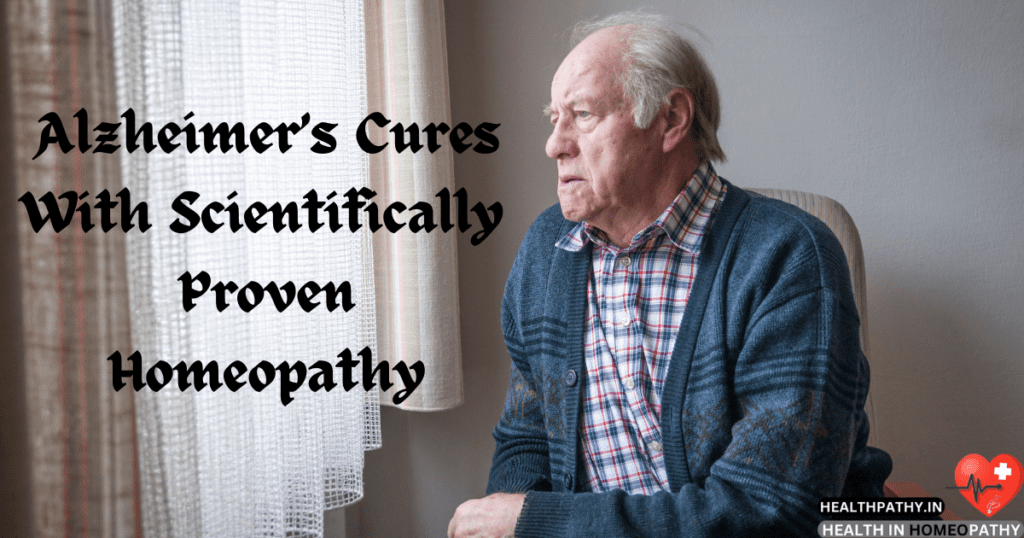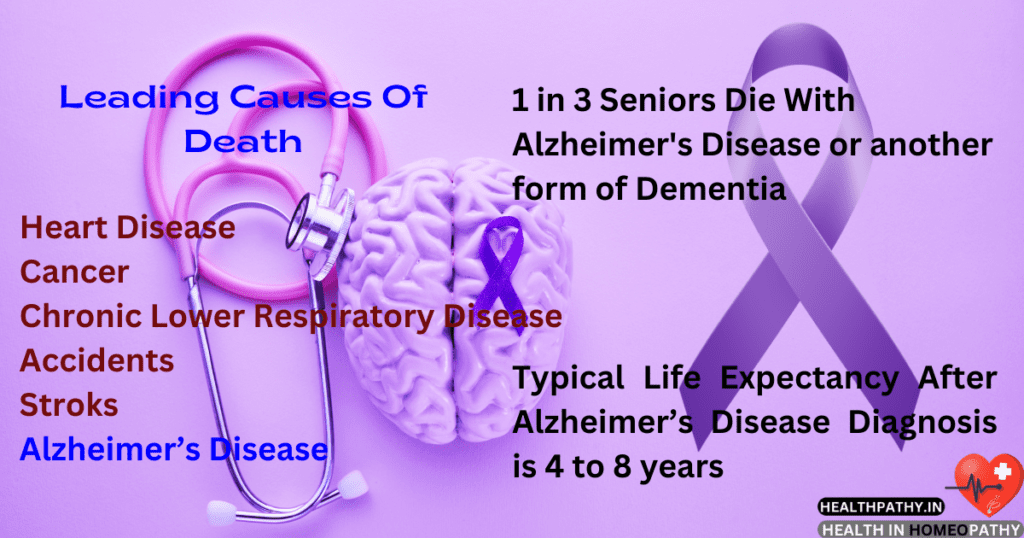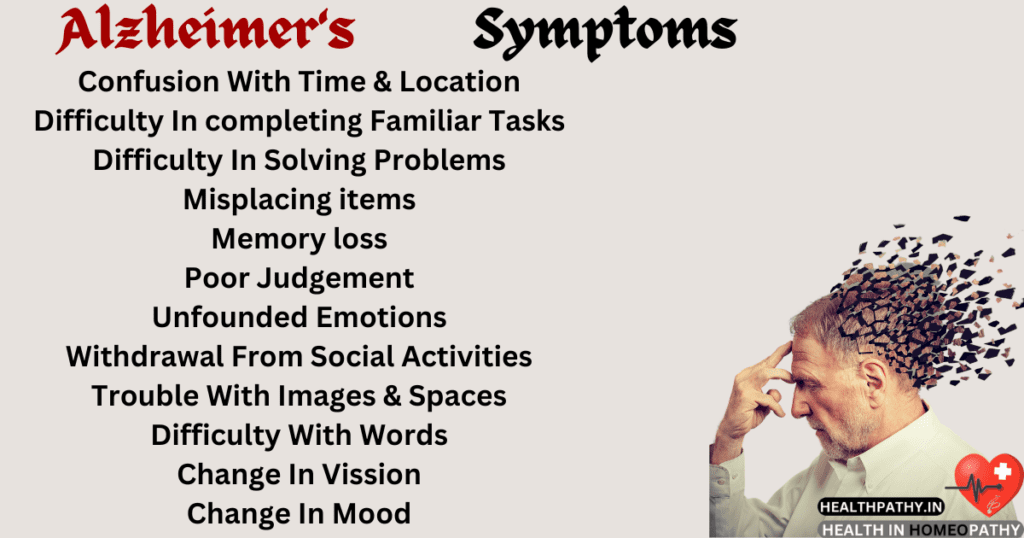Alzheimer’s disease, a situation that influences hundreds of thousands of people worldwide, is an impressive challenge for both those recognized and their loved ones. This innovative and irreversible neurological disorder has a profound effect on memory, cognition, and daily functioning, often robbing people of their capacity to recognize their closest family and friends. In this text, I’m able to discover the complex panorama of Alzheimer’s Disease Cures With Scientifically Proven Homeopathy, delving into its causes, symptoms, prognosis, and available remedy options. By shedding light on this condition, I aim to offer a comprehensive understanding of Alzheimer’s and the importance of ongoing studies and guidance for those affected.
- Alzheimer's Disease Cures With Scientifically Proven Homeopathy
- Unraveling the Nature of Alzheimer's
- Cause: Peering into the Origins
- Navigating the Varieties
- Diagnosis and Tests: Illuminating the Path
- What Happens To The Brain In Alzheimer's
- How To Recognize Alzheimer's Disease
- Signs and Symptoms: Deciphering the Clues
- Effective Homeopathic Cure
- Trusted Mother Tinctures Cure
- Other Safe Treatment Options
- Diet In Alzheimer's Disease: Nourishing The Brain
- The Power Of Do's:
- Mastering The Don'ts:
- Conclusion: Managing Alzheimer's Disease:
- FAQ
- Must Read:
- Must Watch:


Unraveling the Nature of Alzheimer’s
Alzheimer’s disease is a revolutionary neurological disease characterized by cognitive decline and memory loss. It is the most common cause of dementia, a long-term decline in cognitive function severe enough to interfere with daily lifestyles. Alzheimer’s is known for the accumulation of extraordinary protein deposits within the mind, along with beta-amyloid plaques and tau tangles, which disrupt exchange between mind cells and result in their dying.
Cause: Peering into the Origins
The exact cause of Alzheimer’s disease remains a subject of widespread study. However, several risk factors were identified:
- Age: The primary chance aspect is advancing age, with maximum Alzheimer’s cases taking place in individuals over 65.
- Genetics: Family history and unique genes, along with the APOE gene, play a function in increasing the risk of Alzheimer’s.
- Lifestyle Factors: Cardiovascular health, a diet plan, bodily activity, and social engagement are believed to affect Alzheimer’s risk. An unhealthy life can contribute to conditions like excessive blood pressure, obesity, and diabetes, which might also increase susceptibility.
Navigating the Varieties
There are different styles of Alzheimer’s disease, based on the age of onset:
- Late-Onset Alzheimer’s Disease: This is the most common type, typically happening in individuals over 65.
- Early-Onset Alzheimer’s Disease: Less unusually, it influences individuals under the age of 65 and is regularly caused by unique genetic mutations.
Diagnosis and Tests: Illuminating the Path
The diagnosis of Alzheimer’s involves a combination of strategies, which include:
- Cognitive Assessments: These checks assess memory, problem-solving skills, and language competencies.
- Neuroimaging: Brain scans, consisting of MRI and PET scans, can monitor structural and functional brain changes.
- Genetic Testing: Genetic exams, especially for the APOE gene, can offer insights into genetic risk.
Early and accurate analysis is critical for timely intervention and care planning.


What Happens To The Brain In Alzheimer’s
In Alzheimer’s disease, the brain undergoes enormous modifications and damage over time. These adjustments more often than not contain the sluggish deterioration of mind cells, leading to the following key events:
- Formation of Amyloid Plaques: One of the hallmarks of Alzheimer’s is the accumulation of beta-amyloid protein, which clumps together to form plaques. These plaques are toxic to neurons and may disrupt their normal function.
- The buildup of Tau Protein: Another hallmark is the atypical accumulation of tau protein, forming neurofibrillary tangles. These tangles interfere with the shipping of crucial vitamins inside neurons, contributing to their dysfunction.
- Cellular Damage: Neurons (nerve cells) are gradually damaged and destroyed, often in regions responsible for memory and cognitive features. As neurons die, brain tissue atrophies, and the brain’s normal size decreases.
- Interference with Neural Communication: The link among neurons is seriously affected due to the loss of synapses, which can be the connections among nerve cells. This disruption impairs memory, wondering, and conduct.
- Neuroinflammation: Inflammation inside the brain is a commonplace response to the buildup of amyloid plaques and tau tangles. This inflammation can similarly contribute to neuronal harm.
- Impaired Brain Function: As the sickness progresses, people experience a decline in cognitive competencies, memory loss, modifications in behavior, and eventually the loss of the potential to perform daily obligations.
It’s vital to notice that these modifications arise progressively, and Alzheimer’s Disease typically progresses over several years. The actual causes of Alzheimer’s and the mechanisms underlying those modifications are still the subject of ongoing research in the clinical and scientific communities.
How To Recognize Alzheimer’s Disease
Recognizing Alzheimer’s Disease can be difficult, especially in its early stages, although the signs may be subtle. Here are some not-unusual signs and symptoms to watch for:
- Memory Loss: One of the most common early signs and symptoms is forgetfulness, especially for recently discovered records. Individuals may additionally neglect important dates, appointments, or the latest conversations.
- Difficulty with Familiar Tasks: People with Alzheimer’s can also conflict with responsibilities that were once routine, like cooking, dressing, or coping with a budget.
- Disorientation: They may additionally emerge as disoriented about time and location, forgetting where they’re or how they got there.
- Language Problems: Finding the right phrases in communication can be hard. They might also battle to comply with or join in on a verbal exchange.
- Poor Judgment: Individuals can also show off poor decision-making and judgment, which may cause unwise financial selections or an overlook of personal hygiene.
- Misplacing Things: Losing gadgets and not being able to retrace steps to locate them is common. This can include putting matters in uncommon places.
- Changes in Mood and Behavior: Alzheimer’s can cause mood swings, confusion, suspicion, and withdrawal from social activities.
- Personality Changes: People with Alzheimer’s may undergo tremendous personality changes, becoming stressed, nervous, or easily dissatisfied.
- Loss of Initiative: They may additionally become passive and much less engaged in activities they once loved.
- Difficulty with Visual and Spatial Relationships: Problems with imaginative and prescient relationships, like difficulty studying, judging distance, and determining color or assessment, can occur.
- Social Withdrawal: As the ailment progresses, people may withdraw from social activities and finally lose the ability to apprehend cherished ones.
- Difficulty in Managing Daily Tasks: In the advanced tiers, human beings with Alzheimer’s can be unable to control fundamental self-care tasks like eating, bathing, and dressing.
It’s important to not forget that everyone’s experience with Alzheimer’s is specific, and no longer every person could have all of these signs and symptoms. If you or a loved one is experiencing any of these symptoms and they interfere with your daily lifestyle, it is important to search for a medical evaluation. Early diagnosis can assist with better management and planning for the future. A healthcare expert can use behavior tests, together with cognitive tests and brain imaging, to decide whether Alzheimer’s is the purpose of those signs.


Signs and Symptoms: Deciphering the Clues
The symptoms and signs of Alzheimer’s Disease progress at unique levels, ranging from slight cognitive impairment to extreme Alzheimer’s:
- Mild Cognitive Impairment (MCI): This level may involve subtle memory issues and problems with everyday responsibilities.
- Mild Alzheimer’s Disease: Memory loss, language problems, and struggles with daily responsibilities emerge as extra sizeable.
- Moderate Alzheimer’s Disease: Symptoms accentuate, such as significant memory loss, confusion, and behavioral adjustments.
- Severe Alzheimer’s Disease: In the final stage, people may additionally lose the capability to talk, depend upon help for each day’s obligations, and often end up bedridden.
Understanding those stages and their associated symptoms allows caregivers and healthcare professionals to provide suitable care and aid. Medications and non-pharmacological interventions can help manipulate some of these signs and symptoms.
Effective Homeopathic Cure
| Remedy | Indications |
| Anacardium Orientale: | It is suitable for people with memory troubles and problems concentrating. Symptoms may get worse with exposure to cold weather. Warmth and wrapping up may also alleviate signs and symptoms. |
| Baryta Carbonica: | Suitable for people with profound apathy, intellectual dullness, and memory issues. Symptoms might also get worse from grief, emotional shock, or extended stress. Rest and comfort can assist in alleviating signs and symptoms. |
| Lycopodium Clavatum: | It is indicated for individuals experiencing cognitive decline and exhaustion. Symptoms might also get worse in a cold, damp climate. Warmth and overlaying may additionally improve signs. |
| Silicea: | Indicated for individuals experiencing cognitive decline and exhaustion. Symptoms might also get worse in cold, damp climates. Warmth and overlaying may additionally improve signs. |
| Phosphoricum Acidum: | indicated for individuals experiencing cognitive decline and exhaustion. Symptoms might also get worse frin cold, damp climates. Warmth and overlaying may additionally improve signs. |
Trusted Mother Tinctures Cure
| Remedy | Indications |
| Ginkgo Biloba | Supports cognitive characteristics and power. |
| Bacopa Monnieri | Supports mental clarity and concentration. |
| Withania Somnifera | Helps control stress and tension. |
| Passiflora Incarnata | Aids in dealing with restlessness and sleep disturbances. |
| Ginseng Panax | Supports cognitive characteristic and power. |
Other Safe Treatment Options
- Engaging in mentally stimulating activities like puzzles, studying, and crossword puzzles can assist in keeping cognitive feature.
- Regular physical activity, such as walking and yoga, helps with basic fitness.
- Social interaction and retaining meaningful relationships are beneficial.
Diet In Alzheimer’s Disease: Nourishing The Brain
A properly balanced diet plan is essential for Alzheimer’s disease control, as it is able to support cognitive function and standard fitness. While there’s no dietary treatment for Alzheimer’s, specific nutritional techniques could make an effective distinction. Here’s a brief assessment of dietary considerations:
- Mediterranean Diet: The Mediterranean weight loss program, rich in fruits, veggies, complete grains, and healthy fats like olive oil, is related to cognitive fitness. It may additionally help in lessening the chance of cognitive decline in Alzheimer’s.
- Antioxidant-Rich Foods: Foods high in antioxidants, which include berries, leafy greens, and colorful fruits, may also assist in guarding brain cells from oxidative stress.
- Omega-3 Fatty Acids: Omega-3 fatty acids, determined in fatty fish like salmon, in addition to walnuts and flaxseeds, are associated with mental health and can help lessen cognitive decline.
- Whole Grains: Whole grains like brown rice, quinoa, and oats offer a consistent source of energy and may aid cognitive function.
- Low-Sugar Diet: Minimizing introduced sugars is important, as excessive sugar consumption is related to inflammation and cognitive decline.
From Do’s to Don’ts: Transforming Your Life for the Better
The Power Of Do’s:
- Medication Adherence: Follow your prescribed medicine routine diligently. Consistency in taking your medicinal drugs is critical for symptom control.
- Regular Exercise: Engage in an ordinary physical hobby. Exercise can assist in enhancing flexibility, stability, and mobility, which might be regularly compromised in Alzheimer’s.
- Nutrient-Rich Diet: Consume a well-balanced food plan rich in antioxidants, fiber, and tremendous protein. These nutritional choices can aid overall health and have nice effects on symptom management.
- Hydration: Stay adequately hydrated. Dehydration can exacerbate common issues like constipation, so make certain you’re drinking sufficient fluids.
- Regular Check-ups: Maintain a constant timetable of medical test-ups. Regular visits to your healthcare company are vital for tracking ailment development and making necessary adjustments to your treatment plan.
Mastering The Don’ts:
- Self-Adjustment of Medication: Avoid altering your medication dosage or schedule without consulting your healthcare issuer. Self-adjustment can result in unpredictable effects and probably worsen signs and symptoms.
- Excessive Protein Intake: Steer clear of ingesting excessive protein in a single meal. High protein consumption can interfere with levodopa absorption, so spreading your protein consumption throughout the day is really helpful.
- Stress Neglect: Don’t underestimate the impact of stress on your symptoms. Incorporate stress management techniques along with relaxation sporting events, meditation, and counseling into your day-to-day routine.
- Dehydration: Never forget about your hydration desires. Dehydration can cause a variety of fitness problems, including constipation, which is usual in Diseases.
- Social Isolation: Isolating yourself can lead to emotional and mental pressure. Don’t isolate. Engage with guide businesses and hold social connections to enhance your usual well-being.
Conclusion: Managing Alzheimer’s Disease:
In the journey of Alzheimer’s Disease control, a holistic technique is vital. Nutrient-wealthy diets, personalized homeopathic remedies, and mother tinctures, in conjunction with a dedication to staying mentally, bodily, and socially energetic, are helpful. Professional guidance is important, and at the same time as a therapy stays elusive, a tailor-made care plan can appreciably improve the best of life for those residing with Alzheimer’s.
FAQ
Must Read:
Acne Cures With Scientifically Proven Homeopathy
Asthma Cures With Scientifically Proven Homeopathy
Must Watch:
Homeopathy: The Green Medicine Of The Future
Friday 04 April 2025 5:31:39:PM
- Acromegaly Cures With Scientifically Proven Homeopathy - 8 February 2024
- Acidity Cures With Scientifically Proven Homeopathy - 1 February 2024
- Appendicitis Cures With Scientifically Proven Homeopathy - 27 January 2024


